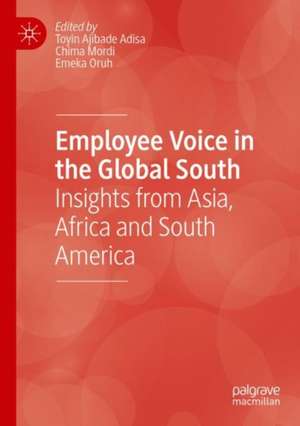Employee Voice in the Global South: Insights from Asia, Africa and South America
Editat de Toyin Ajibade Adisa, Chima Mordi, Emeka Oruhen Limba Engleză Paperback – 11 iun 2024
| Toate formatele și edițiile | Preț | Express |
|---|---|---|
| Paperback (1) | 959.89 lei 38-44 zile | |
| Springer International Publishing – 11 iun 2024 | 959.89 lei 38-44 zile | |
| Hardback (1) | 1111.97 lei 43-57 zile | |
| Springer International Publishing – 11 iun 2023 | 1111.97 lei 43-57 zile |
Preț: 959.89 lei
Preț vechi: 1054.82 lei
-9% Nou
Puncte Express: 1440
Preț estimativ în valută:
183.73€ • 199.64$ • 154.44£
183.73€ • 199.64$ • 154.44£
Carte tipărită la comandă
Livrare economică 16-22 aprilie
Preluare comenzi: 021 569.72.76
Specificații
ISBN-13: 9783031311291
ISBN-10: 3031311299
Pagini: 299
Ilustrații: XXIII, 299 p. 2 illus.
Dimensiuni: 148 x 210 mm
Ediția:2023
Editura: Springer International Publishing
Colecția Palgrave Macmillan
Locul publicării:Cham, Switzerland
ISBN-10: 3031311299
Pagini: 299
Ilustrații: XXIII, 299 p. 2 illus.
Dimensiuni: 148 x 210 mm
Ediția:2023
Editura: Springer International Publishing
Colecția Palgrave Macmillan
Locul publicării:Cham, Switzerland
Cuprins
Part one – Employee Voice in Africa.- Chapter One : Keep Quiet: Unheard Voices of Domestic Workers in Nigeria (By Toyin. Ajibade Adisa, Chima Mordi and Emeka Oruh).- Chapter Two :The Changing Face of Trade Union Movement in South Africa: From a United Movement against Apartheid to Fighting for Survival (By Paul Smith, Nasima M. H. Carrim and Leon Moolman).- Chapter Three :The Impact of the Internet and Social Media on Employee Voice in Egypt (By Ghada El-Kot and Mike Leat).- Chapter Four :Trade Union Effects on Employee Voice in Kenya (By Gladys Muasya).- Part Two – Employee Voice in Asia.- Chapter Five : The Patterns of Employee Voice in China (By Chao Ma, Zhongqiu Li and Xe Zhang).- Chapter Six: A Contingency Approach to Employee Voice in Indian (By Nivedita Jha and Vidu Badigannavar).- Chapter Seven : Gender and Employee Voice: An Insight from Pakistani Organisation (By Muhammad Mehmood Aslam and Muhammad Naseer Akhtar).- Chapter Eight :The nature of Employee Voice in Malaysia: The Mediating Role of Cultural and Institutional Factors (By Au Wee Chan).- Part Three – Employee Voice in the Middle East.- Chapter Nine :The Mediating Role of Culture on Employee Voice: Insights from Saudi Arabia (By Tamara Fahid and Robert Karaszewski).- Chapter Ten :Employee Voice in Jordan: Benefits and Consequences (By Muntaser Melhem and Tamer Darwish).- Chapter Eleven :The Myth and Reality of Employee Voice and Silence in the United Arab Emirate (By Osama Khassawneh and Abdelfatah Arman).- Chapter Twelve: Employee Voice in Bahrain: Managing for Today and Tomorrow (By Chima Mordi, Hakeem Ajonbadi, Olatunji David Adekoya and Adeoti).- Part Five – Employee Voice in South & North America.- Chapter Eighteen : The Role of Employee Voice in Promoting Social and Organisational Justice: Insights from Argentina (By Gisela Delfino and José Delfino).
Notă biografică
Toyin Adisa is a Senior Lecturer in Human Resources Management and Organisational Behaviour at the University of East London, UK. His research and teaching focus is in comparative human resource management, employment relations and reforms in emerging and developing economies. He is a senior fellow of Higher Education Academy, a fellow of Chartered Management Institute, and a member of Chartered Institute of Personnel Development.
Chima Mordi is a Reader/Associate Professor in the College of Business, Arts and Social Sciences at Brunel University London, UK. His research examines international business in emerging and developing markets, with a focus on the state of labour relations, comparative HRM in Africa, Asia and Middle Eastern countries, employer’s flexibility, the regulation of workloads in large firms, and work-life balance of white collar-workers.
Emeka Oruh is a Senior Lecturer in Human Resource Management and Organisational Behaviour at Brunel University London, UK. He previously lectured at the University of Portsmouth School of Business and Law, UK. Emeka is a Fellow of Higher Education Academy, and an Academic Associate Member of Chartered Institute of Personnel Development.
Emeka Oruh is a Senior Lecturer in Human Resource Management and Organisational Behaviour at Brunel University London, UK. He previously lectured at the University of Portsmouth School of Business and Law, UK. Emeka is a Fellow of Higher Education Academy, and an Academic Associate Member of Chartered Institute of Personnel Development.
Caracteristici
Develops our understanding of employee voice in a progressively globalised work context Combines original research, systemic literature review, case studies, and interviews Highlights unheard voices and employee silence across the Global South
